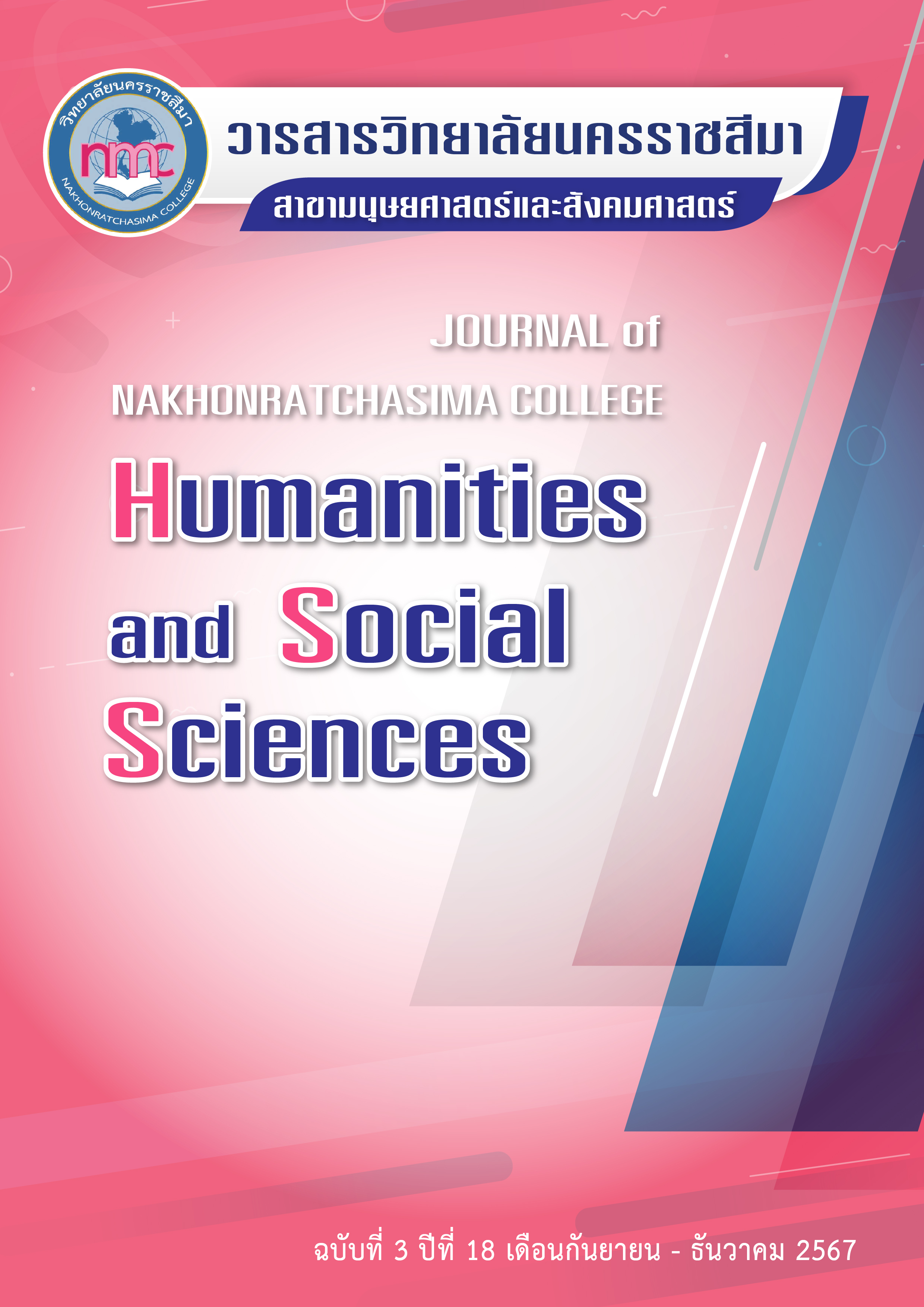Digitalizing Rural Tourism: A Marketing Strategy for Advancing Guangxi's Rural Tourism Sector
คำสำคัญ:
Digitalization, Guangxi Rural Tourism, Marketing S trategyบทคัดย่อ
The objectives of this study were to digitalize Rural Tourism: A Marketing Strategy for Advancing Guangxi's Rural Tourism Sector. The independent variables encompass factors influencing the digital marketing strategy of rural tourism in Guangxi, including tourism products, infrastructure and service quality, publicity and marketing, brand characteristics, cultural excavation, and capital investment. The dependent variable is the digital marketing strategy of rural tourism in Guangxi.
The population comprises tourists who have visited rural tourism scenic spots in Guangxi. The authors selected 300 participants using eluate sampling among tourists (1,200 tourists registered as of August 15, 2023) at rural tourist attractions in Yangshuo Tourism Famous County. The instrument for this study, were the questionnaire of 1. basic tourist information 2. tourist travel behavior Statistical tools were employed for data interpretation and analysis (Suharsaputra, 2014), and the questionnaire was administered until July-August 2023.
The study results indicate that digital technology plays a crucial role in promoting rural tourism in Guangxi. Digital marketing tools enhance the visibility and exposure of rural tourism, effectively attracting more tourists. Simultaneously, the digital platform provides tourists with a better experience and service, improving tourist satisfaction. Digitalization is identified as an inevitable trend in the development of rural tourism in Guangxi.
เอกสารอ้างอิง
Bao Runliao. (2020). Study on the salary incentive of young teachers in colleges and universities. Journal of Yan 'an University (social science edition). 2020,42(05) : 76-82.
Cao Shengwei. (2019). Research on the application of mixed salary policy in private colleges and universities based on the investigation of private colleges and universities in Henan Province . Journal of Hubei University of Economics Science (Humanities and Social Sciences edition). 2019(03) : 62-65
Cheung Wing-sin. (2020). Probe into the problem of human resources salary incentive and optimization strategy. Employment and security, 2020(09): 154-155.
Dencker J C., Joshi A,Martocchio J. and J.Towards. (2008). A theoretical framework linking generational memories to workplace attitudes and behaviors[J]. Human Resource Management Review,2008,18(18):180-187.
Ehule George Ehulonu, Ibara Emmanuel, Chris,Richard and Anietie.Teachers. (2019). Motivation and job satisfaction private secondary schools in rivers state[J]. International Journal of Advanced Research(LJAR), 2019,7(9).
H.Roland, Weistroffer and Michael. (2018). A Spinelli,George C.Canavos,F.Pauls. A merit pay allocation model for college faculty based on performance equality and quantity. Economics of Education Review.
Ingersoll R M. (2019).Teacher Turnover and Teacher Shortages:An Organizational Analysis[J]. American Educational Research Journal,2019(3):499-534.
Kerr Steven. (2016). On The Folly of Rewarding A,While Hoping for B[J].Academy of Management Journal0. 2016,69-83.
Mao Liqun and Zhao Jun. (2005). An analysis of the development of non-governmental universities and teachers salary incentive. China.
Ojo Adeshina and Akinwumi et al. (2021). Influence of Salary Administration and Conflicts Management on Organizational Performance[J]. International Jornal of Psychological and Brain Sciences,2021,6(1).
Osarenmwinda Smart et al. (2021). Determinants of employee motivation in the Nigerian Institutefor oil palm research[nifor]:herzberg'shygiene facto rapproach[J]. Academicia:Aninternational Multidisciplinary Research Journal,2021,11(2):435-452.
Pan Hongxuan. (2016). Research on the salary system of private university teachers based on the theory of total salary. Shandong University, Master.
Qiu Lishu. (2013). A probe into the construction mode of the teaching staff in private colleges and universities. Heilongjiang education (Higher Education Research and evaluation).
Roger. (2014). Reflections on the flexible welfare system for university teachers Economic restructuring, 2014(05),182-185
Song Yanjun. (2006). A probe into the effective incentive mechanism for teachers in institutions of higher learning. Journal of College of Disaster Prevention Science and Technology,2006(04),94-97.
Sutton T P, and Bergerson P J. (2001). Faculty Compensation Systems: Impact on the Quality of Higher Education. ERIC Digest.
Tuomo Rautakivi, Ritthikorn Siriprasertchok and VanthaKorng. (2019). Extrinsic work motivation of urban secondary school teachers: a case study of public
secondary schools and a model secondary school in Phnom Penh,Cambodia Int.J.of Management in Education. 2019,13(2).
Wang Xue and Li Bing. (2020). Research on the optimization of human resource compensation incentive strategy in enterprises. Mall modernization.
Xie Zhikang and Jiang Wenli. (2020). A review of research on performance pay. Statistics & Reason.
Xu Xiaojing. (2006). Study on the salary system of teachers in private universities. Fujian Agriculture and Forestry University.
Xu Zhongkun, Ge Cong, and Zhao Shan. (2019). A study on the salary of teachers in private colleges and universities in Henan province from the perspective of benefit sharing theory. Journal of Taiyuan City Vocational and Technical College,2019, (01) : 73 -74.
Zhang Lihong. (2019). Research on the salary system of private universities based on the broadband salary theory. Modern communication.
Zhou Zhicheng. (2005). The mid-and long-term reform of university salary system should avoid inefficiency and inefficiency. Chinese higher education.
ดาวน์โหลด
เผยแพร่แล้ว
รูปแบบการอ้างอิง
ฉบับ
ประเภทบทความ
สัญญาอนุญาต
จรรยาบรรณผู้เขียนบทความ
ผู้เขียนบทความต้องรับรองว่าบทความนี้ไม่เคยตีพิมพ์ในวารสารใดหรือสิ่งพิมพ์อื่นๆ มาก่อน ต้องไม่คัดลอกผลงานผู้อื่นมาปรับแต่งเป็นบทความของตน และไม่ได้อยู่ระหว่างการเสนอเพื่อพิจารณาตีพิมพ์ อีกทั้งยอมรับหลักเกณฑ์การพิจารณาและการตรวจแก้ไขบทความต้นฉบับโดยกองบรรณาธิการวารสารวิทยาลัยนครราชสีมา สาขามนุษยศาสตร์และสังคมศาสตร์
บทความทุกเรื่องได้รับการตรวจพิจารณาทางวิชาการโดยผู้ทรงคุณวุฒิที่มีประสบการณ์และมีความเชี่ยวชาญตรงตามสาขาของบทความ ซึ่งผู้เขียนต้องแก้ไขตามคำแนะนำของผู้ทรงคุณวุฒิภายในระยะเวลาที่กำหนด หากไม่เป็นไปตามกำหนดกองบรรณาธิการขอสงวนสิทธิ์และยกเลิกการตีพิมพ์โดยจะแจ้งให้ทราบต่อไป
ข้อความที่ปรากฏในบทความของวารสารนี้เป็นความคิดเห็นของผู้เขียนซึ่งไม่เกี่ยวข้องกับวิทยาลัยนครราชสีมาแต่อย่างใด และกองบรรณาธิการขอสงวนสิทธิ์ในการพิจารณาและตรวจประเมินบทความเพื่อตีพิมพ์ในวารสารของวิทยาลัยนครราชสีมา สาขามนุษยศาสตร์และสังคมศาสตร์



